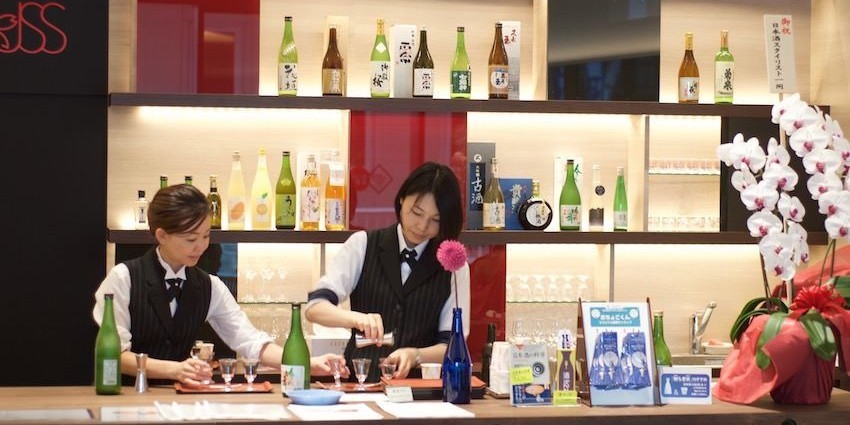The Shimbashi area of Tokyo has no shortage of drinking establishments and great sake bars. It has long been a haven for businessmen looking to unwind after work with coworkers over a few, or substantially more than a few, glasses of sake. Anyone looking to learn more about sake would be well-served by paying the area a visit, though the sheer volume of choices may overwhelm.
Here to help you with that “problem” is the Information Center of the Japan Sake and Shochu Makers Association (JSS). Sponsored mainly by the breweries themselves, the organization has been around for thirty-five years, seeking to promote and educate the public, both foreign and domestic, about Japan’s two major indigenous alcoholic beverages, sake and shochu. On August 29th of this year, the center relocated to a much more visible area of Shimbashi, leaving behind a lackluster older building that was a bit out of the way.
Now on the first floor of the new Nihon Shuzo Toranomon Building on the main street that heads straight out of Shimbashi Station, the new JSS Info Center is a beautifully designed, modernized showroom with a number of bells and whistles. The room is divided basically down the center, with shochu the focus of one side and nihonshu the focus of the other. Each side has a large screen continuously running multiple videos that explain the history and brewing processes of the drinks. Some of the videos have English, and some don’t, but they are well-done and the visuals get the point across. Japanese-challenged individuals, fear not; there are tablets under each video screen to assist in English, Chinese and Korean as well. Pamphlets placed about the room in multiple languages are also an educational help for neophytes to the sake/shochu world.
The center is under the highly qualified guidance of Shuso Imada, a seasoned industry pro. His grandfather was the third son of the brewing family that makes the sake Fukucho in Hiroshima. With two elder brothers in line ahead of him, he decided to move to Tokyo to open a liquor store and sell the family sake. The store eventually grew into a wholesale business dealing in sake and shochu. Imada took over the family business handed down from his grandfather to his father, running the company for many years until he decided to leave after it merged with another company. After working about four years as a marketing consultant for sake, he was chosen to run the JSS Info Center in the spring of 2016. Fluent in English and cheerfully talkative, he has a wealth of knowledge to impart to inquisitive students.
Imada bills the center as a place where you can “see, touch and experience sake.” In addition to the videos screens, each wall has a mini museum of industry memorabilia and products from almost every prefecture. As many of our readers are well-versed in sake, the “experience” part of the visit may be the most satisfying. There are roughly thirty varieties of sake, fifteen shochu and twelve other sake/shochu-based alcohols, such as umeshu and yuzushu, available for tasting.
The sake choices are impressive and all are high-grade. Different regions and rice varieties are represented as well as varying yeast profiles and even different koji. Also on the menu are aged sake, nigori and sparkling types. The majority of the 60ml tasters are ¥200 (30ml, ¥100), with none more than ¥400 when we visited. Additionally, there are a few JSS recommended flights (3 varieties X 30ml) in the ¥200-300 range. You are highly unlikely to find better prices outside of a brewery’s tasting room. The entire menu changes every two to three weeks, so a visit each month will provide a completely new sake adventure.
If you like what you taste, reasonably priced bottles are available for purchase, making it the perfect place to buy souvenirs for friends and family back home. Leaflets announcing upcoming events and sake brewery tours will help guide residents of Japan to wherever the good beverage is pouring. Though some of the staff can communicate in English and can help with recommendations, Imada tells us that he is glad to come down from his second floor office to further educate those with in-depth questions.
If, as a fan of sake, you find yourself in the Tokyo area, it would be more than worth your while to visit the JSS Info Center. You’ll likely learn something new while sampling some quality beverages. It makes for a good, affordable starting point for adventures into sake bars in the area, too. Note that weekday evenings are extremely busy in Shimbashi, so making a reservation for your next destination is recommended.
Tokyo, Minato-ku, Nishishimbashi 1-6-15
Weekdays 9:00-17:30, closed weekends
phone 03-3501-0101
www.japansake.or.jp





